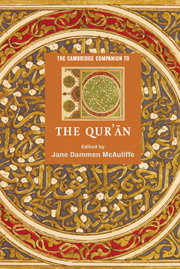Book contents
- Frontmatter
- Introduction
- Part I Formation of the Qur'ānic text
- Part II Description and analysis
- Part III Transmission and dissemination
- Part IV Interpretations and intellectual traditions
- 9 The tasks and traditions of interpretation
- 10 Multiple areas of influence
- 11 Western scholarship and the Qur'ān
- Part V Contemporary readings
- Qur'ān Citation Index
- General Index
10 - Multiple areas of influence
from Part IV - Interpretations and intellectual traditions
Published online by Cambridge University Press: 28 March 2007
- Frontmatter
- Introduction
- Part I Formation of the Qur'ānic text
- Part II Description and analysis
- Part III Transmission and dissemination
- Part IV Interpretations and intellectual traditions
- 9 The tasks and traditions of interpretation
- 10 Multiple areas of influence
- 11 Western scholarship and the Qur'ān
- Part V Contemporary readings
- Qur'ān Citation Index
- General Index
Summary
So the book lives on among its people, stuff of their daily lives, taking for them the place of a sacrament. For to them, these are not mere letters or mere words. They are the twigs of the burning bush, aflame with God . . . 'It is recited by tongues, written in volumes, memorized in breasts.'
'The overwhelmingly central role played by the Qur'ān in Muslim piety' is an axiom that is recognised by both Muslims and outside observers. The book's profound and pervasive influence on all aspects of Islamic personal and communal life and its ubiquitous presence in Islamic sciences, arts, literatures, craftsmanship, devotional practices and everyday speech are richly attested. Less obvious and more difficult to gauge is its impact on the social, familial and political behaviour and on the spiritual and intellectual life of the average Muslim, although this, too, is easy to imagine. Whether the Qur'ān's significance for its followers is due to its irresistible attraction, inherent aesthetic appeal and persuasiveness, or to their 'Islamic' upbringing, schooling and socialisation, its overriding importance for the Muslim community is hardly in doubt. What follows is an attempt to examine the influence of the Qur'ān on such spheres of Arab/Islamic intellectual endeavour as philology, jurisprudence, theology/philosophy and literary production. Considerations of space will necessarily make this survey selective and incomplete.
- Type
- Chapter
- Information
- The Cambridge Companion to the Qur'ān , pp. 211 - 234Publisher: Cambridge University PressPrint publication year: 2006
- 2
- Cited by



